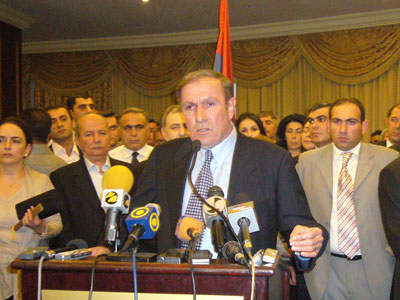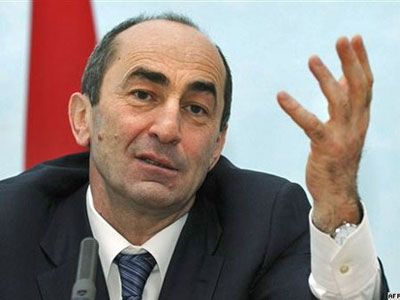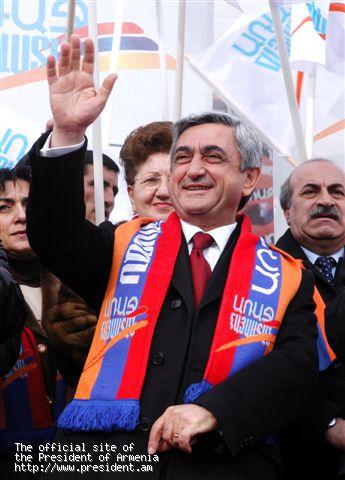“Mounting evidence… has called into question the government’s claim that PM Serzh Sargsyan won a legitimate first-round majority on Feb. 19 [2008]. This result, combined with the subsequent heavy-handed use of force and declared State of Emergency, has left PM Sargsyan with a severe crisis of legitimacy,” writes then US Deputy Chief of Mission (DCM) to Armenia Joseph Pennington in yet another cable — this one dated Mar. 10, 2008 — released by WikiLeaks on Aug. 30, 2011.
Recall that mass protests in Yerevan on Mar. 1–2 against alleged electoral fraud followed the 2008 presidential election in Armenia, the results of which declared current President Serzh Sargsyan (then prime minister) as successor to then President Robert Kocharian.
Pennington notes that the “mounting evidence” includes the latest ODIHR interim report, but that “most observers do not believe PM Serzh Sargsyan did not legitimately won a first round majority in the election,” calling into doubts both the legitimacy and the illegitimacy of the presidential election.
The cable continues listing the series of “hard truths” that the US’ policy deliberations must negotiate “among a thicket of harsh realities that leave us with few truly appealing choices,” including:
“This [that Sargsyan may not legitimately have won the majority] may not have been his own doing. President Kocharian and other influential, anti-democratic forces may each have had their own reasons for engineering this outcome. However, Sargsyan at best has failed to take a strong stand against it, or the subsequent harsh crackdown.
“Serzh Sargsyan has been an excellent, and pro-Western partner as defense minister, accelerating Armenia’s Euro-Atlantic engagement.
“Sargsyan’s main rival, former President Levon Ter-Petrossian (LTP), is no angel. His own presidential administration from independence through 1998 grew increasingly authoritarian and corrupt, and he stole the 1996 presidential election to hold onto power. He and his advisers have privately made clear all along that they fully expected the authorities to steal the election, and thus the LTP strategy was always focused more on post-election public demonstrations to force the government from power, rather than a strategy simply to win at the ballot box.
“LTP is not an isolated extremist. Official figures gave him 21.5 percent (just over 350,000) of votes cast on Feb. 19, and the true figure is doubtless substantially higher. Our best guess would be somewhere between 30-35 percent (490,000 – 570,000 votes). His popular support has only grown in the past two weeks. Many Armenians tell us “it’s not about LTP anymore, it’s about this government’s behavior.”
“Post-election events have made LTP into by far the most legitimate opposition political figure — more so than all the others combined. The regime’s use of force against peaceful demonstrators, the media blackout, and other elements of the crackdown have increased popular outrage, and by default made LTP supporters out of many who still dislike the man. If a run-off election were held now, LTP would very likely beat Sargsyan. Many Armenians now see LTP as the only one with a chance to break down what they see as the deepening entrenchment of a Karabakhi-led kleptocracy in Armenia, seemingly determined to monopolize every lever of political and economic power.
“However much we might suspect LTP’s motives and methods, during the current election cycle, he and his supporters are predominantly the victims while Sargsyan’s supporters were the wrong-doers. However, it must also be acknowledged that there was a cadre of perhaps several hundred people — within the perhaps 20,000 people protesting in front of the French Embassy — which seemed to be pre-prepared and spoiling for a violent confrontation with police. LTP’s most radical lieutenant, Nikol Pashinyan, used extreme rhetoric to exhort protesters to fight. LTP distanced himself from this in our subsequent private conversation, but it is very possible that he was aware and approved of this militant cadre in advance.
“It may indeed be the case that Serzh Sargsyan is, in his heart, more progressive and democratic than his longtime friend and close political partner Robert Kocharian. There have been tantalizing hints that give room for hope on this score. It could also be the case that Sargsyan desperately needs public legitimacy and Western support in order to have the political strength to oust the most corrupt, noxious, and thuggish elements which are now key pillars of the government.
“Withholding that support may pull the rug out from under what could be Sargsyan’s sincere desire to clean house. This may, indeed, have been Kocharian and other influential figures’ goal all along — to ensure that Sargsyan’s election was so tainted as to make it impossible for Sargsyan to marginalize them in the post-election political constellation.”
The American diplomat then goes on to list four possible scenarios in the aftermath of the election:
“SCENARIO 1 — PROTRACTED STALEMATE, INSTABILITY, REPRESSION: We fear the mostly likely scenario over the medium to long term is that Sargsyan will go along with regime elements counselling tough measures. Underestimating the size, strength, and depth of public sympathy that has been generated for LTP, Sargsyan will attempt to crush the LTP-led opposition through police, security services, and prosecutions, jailing many key LTP lieutenants and possibly LTP himself on politically motivated charges. This will make LTP even more of a hero-martyr of democracy. He will find himself relying ever more heavily on a political crackdown to stay in control, and Armenia will end up much more authoritarian than it has ever been since the Soviet period.
“SCENARIO 2 — KOCHARIAN IS CORRECT, OUTRAGE PASSES, STOICISM SETS IN: It may be that — as President Kocharian predicted to DAS Bryza during his recent visit — the widespread popular outrage will die down more quickly and comprehensively than we now suspect. Keeping key organizers in prison may over time be sufficient to keep protests from gaining traction, and society may settle back down into the quiescent, semi-authoritarianism that prevailed throughout Kocharian’s administration. A type of normalcy will resume, in which the broadcast media remain tightly controlled by pro-regime forces, and various elements of society know where the boundaries are. This is a recipe for stagnation and steady deepening of political and economic corruption, behind a window-dressing of democratic platitudes and Westernization — until the next flashpoint emerges on some future day.
“SCENARIO 3 — Sargsyan IS A VISIONARY LEADER AFTER ALL: The most constructive move Sargsyan could realistically make would be to make dramatic steps to promote national reconciliation, and to show his commitment to combat the thuggish and corrupt elements of government. Ending the state of emergency and media blackout are important steps, as would be ending the flagrantly partisan programming now airing on public television. Longer term, management changes in the national television/radio regulatory commission and in the Public Television channel to introduce objectivity and balance would be very positive steps. By prosecuting pro-governmental as well as oppositional figures for election and post-election crimes, while freeing the majority of pro-opposition figures that have been arrested, he could establish fresh credibility. His choice of a new prime minister and cabinet will be an important bellwether of the direction he intends; a good crop of fresh, clean faces would win public approval, while recycling corrupt ones would deepen public cynicism.
“SCENARIO 4 — Sargsyan FALLS: We have been surprised that several serious, non-opposition political thinkers have independently told us privately that they expect, based on events of the past two weeks, that Serzh Sargsyan will be unable to hold power for more than a year or two. This argument holds that the opposition genie is now out of the bottle. Armenians are widely shocked and traumatized by the events of Mar. 1. No Armenian government has before been responsible for suppressing opposition protests so forcefully as to lead to fatalities. An accelerating cycle of reaction and counter-reaction (as postulated in Scenario 1), could get out of Sargsyan’s control or require a more heavy-handed response than the security forces themselves are prepared to stomach. Some Armenian political observers insist to us that Armenians are different from other post-Soviet societies, in that they have a lower willingness to tolerate state violence. They are proud of their history of standing up against Soviet tanks in 1988 to demand independence, and have a highly developed sense of national unity. Armenian soldiers and police firing on Armenian citizens is seen by many as crossing the Rubicon. Depending on how events unfold, LTP could yet manage to harness enough public outrage to provoke a people-power revolution. Alternatively, in the face of a rising cycle of crises, Sargsyan could face the fate that LTP himself faced in 1998, and be ousted by an insiders’ coup.”
Pennington concludes his analysis by the US’ possible next steps:
“REWARD GOOD BEHAVIOR: In the near term, the best strategy available to us is to support in whatever way we can any genuine efforts from PM Sargsyan along the lines of Scenario 3 above. We have repeatedly urged these types of gestures to the PM and his aides, and will continue to do so. We have already and will continue to convey messages back and forth between the government and the LTP camp to the extent the two parties find that constructive.
“WHILE NOT COMPROMISING OUR PRINCIPLES: Equally as important as encouraging the prime minister and other stakeholders to do the right things, will be for us to tell the truth as we see it. We strongly believe that we do neither the Prime Minister nor Armenian democracy any favors if we soft-pedal our criticism of anti-democratic behaviors, whether from the government or opposition side. We must send firm and clear messages to the PM and other government interlocutors, as well as to the opposition, that we will hold them accountable for the way they manage this crisis. Bad behavior will lead to consequences in US engagement and assistance. In the long run, Armenian public opinion (which tends to have a surprisingly long memory) will hold us accountable for whether we are seen to stand up for democratic principles. We should not allow our hopes for Sargsyan’s better nature to run too far ahead of demonstrated, tangible commitments on his part.
“WHEN TO CONGRATULATE Sargsyan: There was much discussion during EUR DAS Bryza’s visit here last week among the Western diplomatic missions about when those capitals which have not formally congratulated Sargsyan for winning the presidency should do so. Our view is that a White House congratulations would not be appropriate under the current state of emergency and media blackout. We recommend that such congratulations be deferred until A) after the state of emergency is lifted, or B) just before the April 9 inauguration date, whichever comes first. We recommend that the congratulatory message also include messages about the need to address political divisions in Armenia.”
 Epress.am News from Armenia
Epress.am News from Armenia


